Letter to Shareholders
Dear Shareholders,
Opening my Letter for 2018, I took a moment to remember the incredible man that was Sergio Marchionne who was painfully taken away from us far too early. 2023 marked the five-year passing of this extraordinary leader and wonderful friend, whose legacy continues through the Sergio Marchionne Auditorium at CERN, the world’s largest particle physics laboratory and research centre.
Designed by Renzo Piano, the CERN Science Gateway was inaugurated in October 2023. We are proud to have contributed to this futuristic building, which combines two important themes for my family: education and innovation. Through immersive exhibits, workshops and experiences, people of all ages and backgrounds will be able to understand the beauty and relevance of science as more than 150,000 visitors have already done so. CERN embodies our belief in the future, while also reminding us of the role of great innovators, like Sergio, who helped carve the path forwards.

Almost twenty years ago, in June 2004, Sergio was appointed CEO of Fiat. The company had gone through a series of CEOs in the leadup to his arrival and was on the verge of bankruptcy. When I reflect on where we are today, I am very grateful to Sergio for showing us that the impossible is possible. His courage and tenacity saved first Fiat and then Chrysler and the jobs of the hundreds of thousands who were working directly and indirectly with these companies. Today we see the same courage and tenacity in the leadership and people of Stellantis.
As we continue moving forwards, we will always remember what Sergio rightly said, “mediocrity is never worth the trip”.
We dearly miss you, caro Sergio.
In 2023, Exor’s Net Asset Value (NAV) per share increased by 32.7% outperforming our benchmark, the MSCI World Index, by 15.1 p.p.
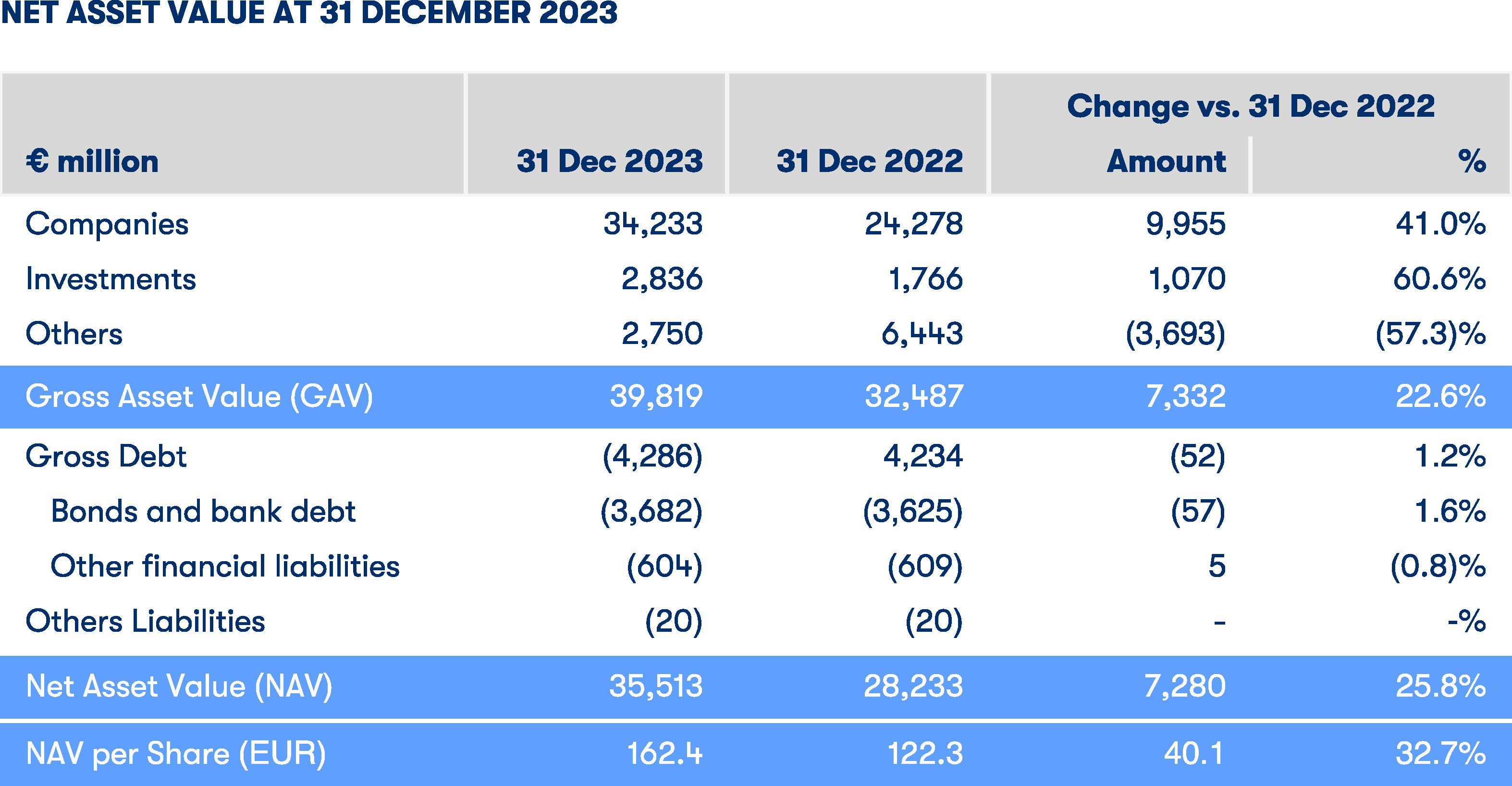
The main driver of our NAV per share growth this year has been the great performance of our largest companies, Ferrari and Stellantis, which increased in value by 52% and 59% respectively: a combined rise of €8.2 billion.
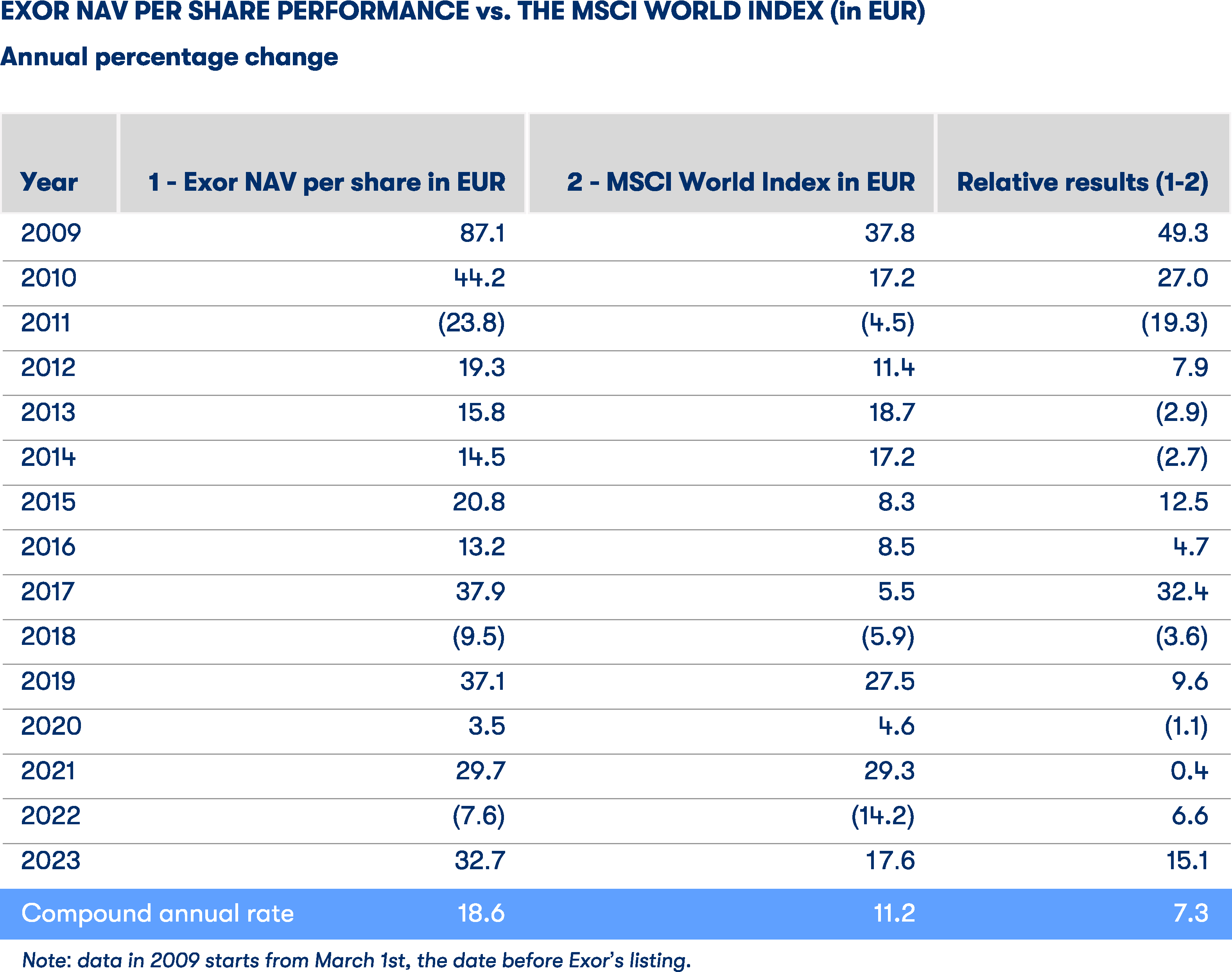
Companies (86% of GAV)
As I have mentioned in the past, our purpose at Exor is to build great companies. To do this, we need to align ownership, governance and leadership within our companies so we can provide appropriate support and challenge as they pursue their paths to greatness.
Our most valuable Companies
Among our companies, the two largest contributors to our Gross Asset Value (GAV) are Ferrari and Stellantis, which together represented close to 60% at the end of the year.
Ferrari enjoyed another extraordinary twelve months with record results and achievements across its three souls: racing, sports cars and lifestyle. During 2023, five new models were launched, including the Ferrari Roma Spider and the 499P Modificata. The latter is a strictly limited-series car for non-competitive track use and a modified version of the 499P hypercar that triumphed in the centenary edition of Le Mans in June as part of the World Endurance Championship.
After twenty-four hours of intense competition, difficult conditions and mental fortitude, Alessandro Pier Guidi, Antonio Giovinazzi and James Calado claimed victory, having completed 342 laps of the famous French track. It was a perfect return for the Prancing Horse after a fifty-year absence and represented its tenth victory overall at this legendary race. The efforts of the mechanics, engineers and drivers combined with the absolute commitment of the support team and its tifosi underline Ferrari’s ability to combine performance with passion like no other.
This passion, together with a deeply heartfelt sense of community, continues to nurture Ferrari every day. Last year, almost 750,000 visitors were welcomed at the two museums in Maranello and Modena.
Off the track, Ferrari continued to deliver outstanding results, with the company exceeding its full-year guidance. Net revenues for the year grew 17% to €6 billion, with an adjusted EBITDA of €2.3 billion (38% margin) and, for the first time ever, net profit exceeded €1 billion (an increase of 34% versus 2022).
To enable its people to continue to grow and innovate, Ferrari coordinated several initiatives in 2023 that included receiving the Equal-Salary Certification on a global level for the first time and providing more than 135,000 hours of training to its employees. For 2024, the company announced the introduction of a broad-based share ownership plan for its employees. In addition, Ferrari extended the activities and scope of its employee welfare programmes with the expansion of health check-ups and parental support.
We look forward to more victories with clients, fans and employees as Benedetto Vigna and his leadership team maintain their four-wheels-on-the-ground approach as the Prancing Horse continues its electrification journey while staying true to its heritage.
Stellantis celebrated its third year of existence in 2024, but we must always remember that the brands at its core – such as Peugeot which was founded in 1810 – are far older. However, while the brands remain, the requirements of a car maker have greatly changed over the last two centuries. Today we live in a world where mobility is no longer just about getting from A to B but is an all-encompassing experience that incorporates many different technologies together with a rethink of how that mobility is powered.
Stellantis has responded to those changing requirements by putting electrification at the forefront of its Dare Forward 2030 strategic plan. It is targeting 100% of passenger car sales in Europe and 50% of passenger car and light-duty truck sales in the United States to be battery electric vehicles (BEVs) by the end of the decade.
Today, Stellantis is well on track to achieve this with global BEV sales up 21% year over year. In addition, as part of the Pro One strategy for its commercial vehicles, Stellantis unveiled a fully renewed van lineup across its six iconic brands (Citroën, FIAT, Opel, Peugeot, Ram and Vauxhall) featuring second-generation zero-emission powertrains, a unique hydrogen solution, full connectivity and top-level autonomous driving assistance systems.
When we look at the evolution of the electric vehicle (EV) market, it is China that is, and will continue to be, the prominent player. With a differing approach focused on adjacent industries (buses and motorcycles), batteries (the costliest component with 70% of lithium-ion batteries today being made in China) and a low-cost and often high-quality supplier base, China is pushing ahead with its EV expansion. Bloomberg estimates that out of a projected global total of 16.7 million passenger EVs sold in 2024, six out of ten will be sold in China, with Chinese players also continuing to export EVs worldwide.
Stellantis has been active and decisive when looking at opportunities to increase its exposure in the EV market. In October 2023, the company made a significant investment of ~€1.5 billion to acquire ~20% of Leapmotor and formed Leapmotor International, a 51/49 Stellantis-led joint venture that has exclusive rights for the export and sale, as well as manufacturing, of Leapmotor products outside Greater China. This is an industry-first global EV relationship between a leading automaker and a Chinese BEV pure player. Stellantis will be able to support the growth of Leapmotor in markets outside of China, while Leapmotor’s EV ecosystem in China will complement the one Stellantis already has.
Carlos Tavares and his leadership team have maintained their focus on great products and customer satisfaction throughout an intense year with increasing competition and regulatory uncertainties. The drive to compete and focus on excellence generated record results with revenues of €189.5 billion (up 6% compared to 2022), an adjusted operating income of €24.3 billion (~13% margin) and net profit of €18.6 billion (up 11%).
These excellent results are not only rewarding shareholders but also Stellantis employees, who will receive nearly €1.9 billion based on their achievements. Including this figure, a total of €6 billion has been distributed back to employees worldwide since its foundation in 2021; a tangible demonstration of how the company has aligned its incentives to its results for the benefit of all employees. In November, the company piloted “Shares to Win”, its first employee share purchase plan that enables them to become shareholders in Stellantis on preferential terms. This will be expanded to over 240,000 employees worldwide in 2024.
We strongly believe in an ownership culture and have supported both Ferrari and Stellantis in enabling their employees to become owners. The positive employee response to these initiatives clearly demonstrates their confidence in the future of their companies.
Our growing interest in healthcare
We view healthcare as a long-term, structural growth sector driven by the favourable dynamics and strong fundamentals I outlined in last year’s Letter. The increased cost of healthcare services combined with a shortage of medical staff is driving demand for innovative new approaches to tackle global health problems.
We believe that prevention and technology are critical areas for this innovation. Earlier and more efficient in vivo and in vitro diagnostics will be needed to treat patients better and more efficiently. Technology can improve productivity, allow patients to be treated outside of the hospital and free up healthcare professionals’ time. The healthcare industry stands at the intersection of critical societal needs and technological advancements, which will continue to drive innovation for the foreseeable future.
For these reasons, we have cumulatively deployed almost €4 billion in healthcare, both through investing in companies and through Exor Ventures. We have focused our company investments within growing and resilient segments, while with Ventures we are expanding our knowledge in the most innovative subsegments, which I will describe later.
In 2022, we invested nearly €1 billion in two companies: Institut Mérieux and Lifenet Healthcare. Our conviction was supported by our strong alignment with both the Mérieux family, the founders and owners of Institut Mérieux, and Nicola Bedin, the founder and CEO of Lifenet.
Over the course of last year, bioMérieux, the largest company in the Institut Mérieux portfolio and representing more than 80% of its GAV, continued to grow even after the end of the pandemic. To detect infectious diseases, bioMérieux uses a number of different technologies across microbiology, molecular and immunoassays. Overall, the company performed well in 2023. While most of its peers saw their sales decline significantly due to the post-COVID normalisation effect, bioMérieux’s like-for-like revenues grew by 6.6% to €3.7 billion, demonstrating the strong resilience of its in vitro diagnostics (IVD) portfolio.
Also, in terms of profitability, the company reported good results (16.6% adjusted EBIT margin), 1.2 p.p. above pre-COVID levels and is working hard to continue improving profitability and close the gap with the top performing IVD players.
bioMérieux is constantly looking to innovate its portfolio and is continuing to expand in other high-growth areas, like Point of Care settings, through the launch of new products such as SPOTFIRE, or anti-microbial resistance testing, through its investment in Specific Diagnostics. They recently strengthened the partnership with Oxford Nanopore by acquiring a ~7% stake with the aim to apply their scalable and cost-effective Next-Generation Sequencing technology to infectious diseases testing.
Overall, bioMérieux has had a strong operating performance over the last few years. Since 2019, the last pre-COVID year, revenues have increased by €1 billion and adjusted EBIT by approximately €200 million. bioMérieux will continue to be a key IVD player, facing the increasingly complex and demanding global public health challenges with an innovation focused mindset.
Working alongside the Mérieux family, we are also pleased to support their overall strategy as they continue to invest in healthcare. This includes the investments they are making through Mérieux Equity Partners, which has reached over €1.5 billion in Assets Under Management, and Mérieux NutriSciences, which continues to grow within the interesting food testing market. We also support the steps they have taken to simplify their portfolio such as their disposal, in December 2023, of ABL Europe, their CDMO (Contract development and manufacturing organisation) to Oxford Biomedica.
As I mentioned in last year’s Letter, in 2022 we acquired 45% of Lifenet, an Italian company focused on the management of hospitals and outpatient clinics. Lifenet, being a dynamic player in the market, is ideally positioned to navigate the ongoing changes in the industry, supported by a strong and experienced leadership team. Since our investment in 2022, Lifenet has completed three acquisitions and we remain firmly committed to supporting them in their growth trajectory, both organically and through further acquisitions.
In August 2023, we further expanded our presence in healthcare by building a 15% stake worth €2.8 billion in Philips. Throughout its 130-year history, Philips has built a trusted and valuable brand. The company has introduced numerous innovations that have constantly kept it at the forefront of both the consumer and healthcare market.
Philips was founded in 1891 in Eindhoven, the Netherlands, by Frederik Philips and his eldest son, Gerard. Recognising the opportunity presented by the mass-market introduction of electricity, and inspired by Gerard’s interest in science and engineering, the pair, joined by the second son Anton, soon began selling cost-effective electric incandescent light bulbs.
The company’s involvement in health technology can be dated back to 1914, through its research activity on X-ray tubes. During the 1930s, Philips also introduced its rotary electric razor, the Philishave. After World War II, the company entered the age of modern electronics through the introduction of its television.
As the company was developing the components for its consumer electronics, Philips also became one of the largest semiconductors manufacturers in the world (#2 globally in the 1970s and 1980s). In 1984, the company spun out ASML, which is currently one of the world’s largest manufacturers of chip-making equipment and the 3rd most valuable company in Europe (with a market capitalisation of ~€360 billion). In 1987, Philips, alongside the Taiwanese government, also co-founded the Taiwan Semiconductor Manufacturing Company (TSMC), which today represents the largest independent semiconductor foundry worldwide with a market capitalisation of ~€580 billion. Since then, Philips also continued reshaping the consumer electronics landscape by introducing innovative solutions (e.g. CDs), reaching a peak of ~€38 billion in sales in 2000.
Over the past 20 years, Philips has undergone a profound transformation to reshape its portfolio and become a focused healthcare company. The company started this change in 2006 when it divested its semiconductor unit (later renamed NXP Semiconductors). In 2011, Philips announced the disposal of its 60-year-old television business and soon after, also exited its Lifestyle Entertainment business (which made audio and video equipment, including headphones and DVD players). The most important disposal was the IPO of its Lighting business (now called Signify), which took place in 2016. In 2021, the company also sold its Domestic Appliances segment, the latest step in its transformation into becoming a fully focused healthcare player, with deep customer relationships and strong leadership positions in attractive markets.
In parallel, over the past 10 years, Philips has strengthened its healthcare portfolio within fast-growing and highly profitable businesses such as Image-Guided Therapy, Ultrasound, Monitoring, and Personal Health. It deployed close to €9 billion in acquisitions (net of cash), of which the three largest were Volcano (acquired in 2015 for ~€1.0 billion), which makes intravenous catheters for ultrasound scans, Spectranetics (acquired in 2017 for ~€1.9 billion), which makes catheters to treat heart diseases and BioTelemetry (acquired in 2021 for ~€2.3 billion), which makes devices and delivers services to monitor remotely irregular heart rhythms.
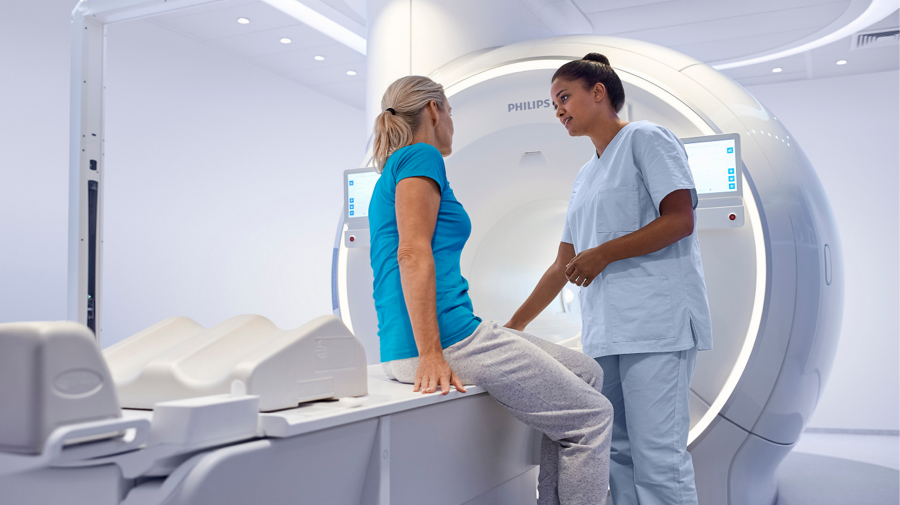
In recent years, Philips has faced difficult challenges. In particular, since 2021, the company faced a recall affecting its Sleep & Respiratory Care business, highlighting the high-performing quality management systems demanded from healthcare technology players. Over the same period, Philips has also tackled operational and supply chain disruptions, with key component shortages (e.g. chips) holding back deliveries, especially in its Diagnosis & Treatment segment. As a result, the company’s market cap dropped by 75%+ from its peak (€46 billion in April 2021 to €11 billion in November 2022) before recovering to €19 billion by the end of 2023.
We believe Philips fits well within our healthcare portfolio. The company has leadership positions in highly attractive segments that offer significant potential for growth and margin expansion, such as Image Guided Therapy, Ultrasound, Monitoring and Informatics. These segments are strongly exposed to the positive changes permeating healthcare, like a demand for more precise and less invasive surgery, a greater focus on prevention and the growing role of data.
The company is seeking to improve 2.5 billion lives per year by 2030. While Philips pursues its purpose of improving people’s health and well-being through meaningful innovation, it wants to deliver superior long-term value to its customers and shareholders. The leadership has a solid turnaround plan and a focus on bringing the company back to a healthy top-line growth (mid-single-digit) and profitability (mid-to-high teens) after 2025. The early signs are positive, with Philips delivering good 2023 results of €18.2 billion in revenues with mid-single-digit comparable sales growth and low double-digit profitability, strong free cash flow of €1.6 billion and carried out clear actions to strengthen its balance sheet, outperforming its original targets.
In line with what I described earlier, what further strengthened our conviction was the alignment we saw between the ownership, governance and leadership in Philips.
Regarding ownership, we entered into a relationship agreement to acquire 15% of the shareholding in Philips (with the opportunity to increase our stake to a maximum of 20%) making us the largest shareholder in the company. I would like to thank Benoît Ribadeau-Dumas for his determination and efforts to build our relationship with Philips and we were pleased he was proposed as a Director for the Supervisory Board.
In terms of governance, our discussions with Feike Sijbesma, Chair of Philips, increased our conviction that he and the Board were tackling head-on the challenges the company was facing with a clear agenda of change. When looking at leadership, Roy Jakobs, who began his role as CEO in October 2022, and his largely renewed and experienced team have a clear plan to address company-specific issues and implement the required cultural and organisational changes to drive profitable growth.
We are fully supportive of Philips’ leadership and strategy. The company is in a good position to capture the exciting opportunities shaping the healthtech sector.
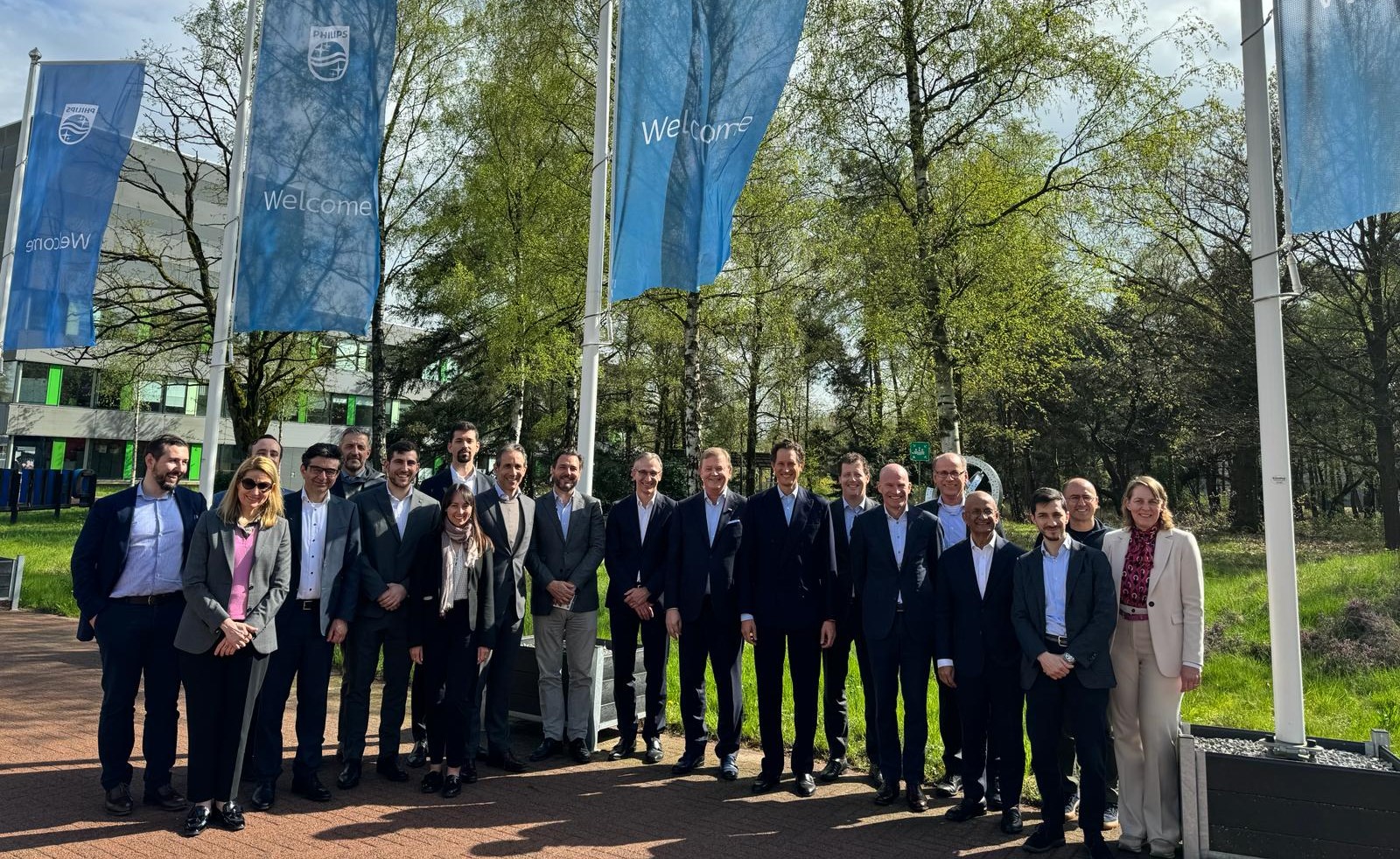
While 2023 included some excellent results from our largest companies and the arrival of Philips as our newest one, it also represented a more challenging year for two of our smaller companies: GEDI and Juventus.
Since Gruppo Espresso and ITEDI decided to merge in 2016 to create GEDI, daily newspapers have seen a constant decrease in their share of the advertising market, which has now fallen below 5% (from more than 8% in 2016). At the same time, the advertising revenues captured by digital players have rapidly increased and are now estimated to account for more than 40% of the market. The circulation of all Italian newspapers has decreased on average by more than 10% per year, particularly following the COVID pandemic, with circulation now at 1 million copies, less than half the number in 2016. This combination of a decreasing share of the advertising market combined with declining circulation and inflationary costs has strongly impacted the economics of the news business.
Despite this challenging environment, GEDI has been carrying out decisive actions to position itself more favourably against its competitors. Since Exor became its majority shareholder in 2020, the media company’s focus has pivoted towards digital, which is better suited for its national titles. As a result, almost all its local newspapers have been sold, the most recent being Il Secolo XIX.
Today, GEDI’s news strategy is centred around La Repubblica and La Stampa, two of the main newspapers in Italy, whose significant print presence is being complemented by a growing digital offering. We continue to believe in the importance of reliable and high-quality journalism, especially in a world where it is sometimes hard to trust what we read. This is critical as we form opinions and, for that reason, we must never lose independent journalism that is true to the identity and values of the newspapers and readers they serve, not to the interests of who owns them.
GEDI, through a combination of organic initiatives and selected digital acquisitions, is also broadening its portfolio and is increasingly able to engage with younger audiences. One such example is Stardust, a digital content creation platform fuelled by a carefully chosen and nurtured roster of ambassadors and influencers, where GEDI first entered as a minority shareholder in 2022 before transitioning to a majority in 2023.
These initiatives are helping drive GEDI’s digital transformation with tangible results. On average, GEDI reaches 4.7 million unique users per day across its websites, ranking it as the number one player among Italian news publishers. Digital subscriber numbers have seen a double-digit year-on-year increase since we acquired GEDI with a 50% increase over the last year. Digital revenues are now more than €125 million, or 26% of total revenues.
The entertainment side of GEDI is also showing positive signs. Radio Deejay reaches on average 5.5 million listeners each day. This makes it the third most popular radio station in Italy and the largest in terms of social media presence, with 1.2 million Instagram followers (no other Italian radio station has more than 1 million). In 2022, GEDI also launched its podcast factory, OnePodcast, created with very limited costs, by efficiently using the expertise of its editorial team and its in-house radio business. It now has 170 original series, and reached 17 million streams per month in 2023, with its Elisa True Crime series being the most listened to Italian podcast on Spotify last year.
The road ahead for GEDI remains challenging. However, Maurizio Scanavino and his leadership team are determined to accelerate its digital transformation journey. We remain convinced in the fundamental value of content in entertainment and news both for today and tomorrow.
Maurizio has also had his hands full with Juventus, where 2023 represented a year of transition. Under its newly appointed Board, chaired by Gianluca Ferrero, the focus has been on resolving the issues it was facing with Sport Justice, both in Italy and Europe.
While reiterating the correctness of its actions, Juventus effectively addressed the issues and started planning for the future without the backdrop of tension and instability that had characterised prior seasons.
On the back of these developments, Juventus began its turnaround, appointed a new Sporting Director and launched a capital increase of €200 million that was successfully completed. The 2023/24 season is therefore “Year-Zero” for Juventus, in which the company is putting in place the foundations for its comeback, both on and off the pitch.
Cristiano Giuntoli, who joined in 2023 and has just been named Best Sporting Director of the year at the Globe Soccer Awards for his work with Napoli last year, will help shape the Juventus of the future. The team aims to return to the Champions League and has already confirmed its presence in the expanded FIFA Club World Cup in the summer of 2025. With an increased focus on young talent from its Next Gen team (who have proved their value this year), Juventus aims to build a sustainable cost structure in line with the new regulations from UEFA, which require clubs to increasingly reduce players’ wages and amortisations as a percentage of operating revenues.
If you are familiar with our supporters, players and spirit, then the phrase fino alla fine will not be new to you. It represents the club’s determination to keep fighting and overcome adversities, a belief that Edoardo Agnelli embodied when he stepped into the role of Chairman on 24th July 1923. This began a one-hundred-year love story between the bianconeri families and my own that we celebrated with the generations of Juventus tifosi in Italy and around the world in 2023 – all of us united by our love for Juventus.
Forza Juve!!!
I would like to spend some time reflecting on the performance of some of our private companies that enjoyed a strong 2023: Christian Louboutin, Welltec and TagEnergy.
Since we invested in Christian Louboutin in 2021, the company has grown strongly with healthy double-digit profitability and cash generation. Following the post-COVID growth, however, the broader luxury market expansion is returning to more normalised rates and its players will need to adapt to this new environment.
As the overall luxury industry sees its growth slow, Christian Louboutin is focusing on delivering a strong financial performance while continuing to innovate its products and maintain its brand positioning. The company is exploring new categories (e.g. its eyewear collaboration with Marcolin) and collaborations with other brands (e.g. Christian Louboutin for Maison Margiela, which was a hit at this year’s Grammy Awards) and artists (Christian Louboutin provided the shoes for Taylor Swift’s current world tour). It also keeps on expanding its shoe offering, with flat shoes, low heels and boots becoming increasingly popular in its women’s range while its men’s range continues to strengthen.
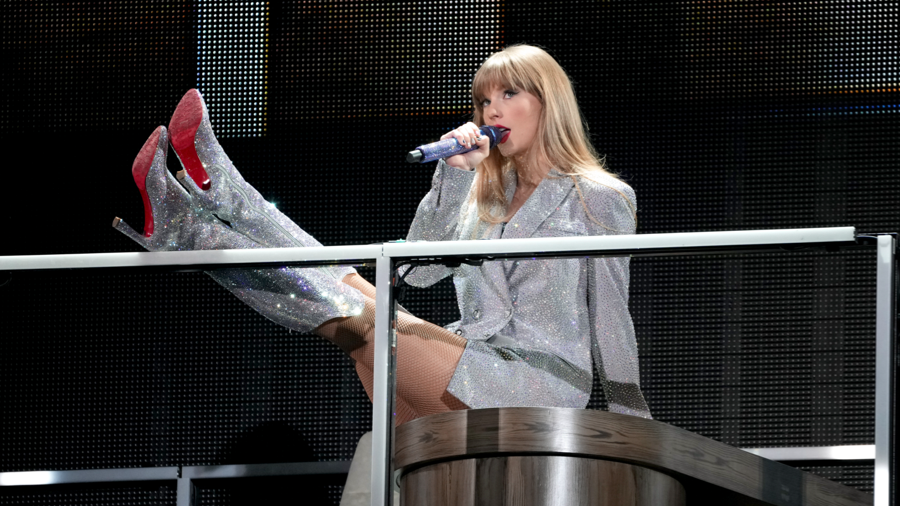
As the company progresses towards its target of passing €1 billion in revenues, we continue to be excited about its prospects and the partnership that we have had over the last three years encourages us in our belief of a bright future, in spite of short-term industry difficulties.
Following strong results in 2022, we were delighted to see Welltec continue to deliver record results both in terms of revenue and profitability, with industry-leading growth and margins in 2023. Revenue and EBITDA grew by 25% and 32% year-on-year to $435 million and $230 million (53% margin), respectively. Net profit also increased from $65 million to $106 million, an impressive result given that the company generated its first substantial net profit since 2014 of $5 million only in 2021. A strong cash flow generation has allowed the company to reduce its leverage ratio from 3.1x to 0.7x and be upgraded by rating agencies.
Favourable market conditions have driven performance as the growing spend in the oil and gas business positions Welltec well with its superior technologies. This has ensured revenue and earnings growth significantly higher than peers as clients increasingly select best-in-class products and services. Under the leadership of CEO Peter Hansen and his team, the company has successfully expanded in the Middle East and strengthened growth by building long-lasting international client relationships. With its efficient and asset-light operating model, Welltec is well-positioned to provide reliable services and solutions that are only growing in importance in the energy sector.
In 2023, we added TagEnergy, a clean energy company dedicated to accelerating the energy transition, to our portfolio of companies when we invested €100 million to fund part of its pipeline of projects. Established in 2019 and based in Lisbon, Portugal, TagEnergy’s operations encompass the entire energy generation process, from the development to the operation of different types of clean energy production plants.
The majority of TagEnergy’s assets are renewable wind and solar projects, alongside a growing offering of energy storage solutions and grid stabilisation services. TagEnergy has a diverse portfolio of projects at various stages of development across Australia, the UK, Portugal and several European nations. The largest project in their portfolio is Golden Plains, which will become Australia’s biggest wind farm and will power more than 765,000 homes. This is currently under construction and is due to start operations in 2025.
Our investment in TagEnergy has allowed us to partner with Jacques Veyrat and Franck Woitiez, two like-minded entrepreneurs in the renewable energy sector who lead a highly experienced team. Their prior track record, marked by innovative strategies, astute decision-making, and effective execution, has solidified their reputation as a driving force in the industry. We look forward to supporting Jacques, Franck and the TagEnergy team by providing long-term capital as they expand their operations and build a great company.
In last year’s Letter, I mentioned how we are now presenting our GAV in three segments: Companies, Investments and Others. Under the Investments section, we include the Venture activities led by Noam Ohana as well as the activities of our alternative investment manager, Lingotto, that was born in May 2023 and is fully owned by Exor.
Exor Ventures
Since its inception, Exor Ventures has invested just over $600 million across approximately 100 companies. Despite a challenging market in 2023, Exor Ventures found many good opportunities, deploying ~$100 million in 22 new investments, of which ~40% were in early-stage healthcare. As I mentioned earlier in this Letter, we have developed a systematic approach to deepen our sector expertise that is helping us identify interesting investment opportunities. Below, I have outlined three themes within healthcare that we have found particularly interesting.
Firstly, new tools and instruments that process biological data with an unprecedented level of depth, speed and volume. Like semiconductors in electronics, sequencers and other tools for life sciences allow the analogue-to-digital conversion of biological data, enhancing our understanding of diseases. Since the original sequencing of the human genome in 2000, technological breakthroughs have collapsed the cost of sequencing from a few hundred million dollars to $100 today. This has been a major driver of the biotech industry, unlocking new diagnostics and therapeutic modalities including cell and gene therapies. We expect a similar revolution to unfold in related sectors like proteomics, which the Ventures team is closely watching.
Robotics and automation are enabling unprecedented precision, reliability and scale across a range of functions in healthcare and life sciences. Despite the great promise of advanced therapies, prohibitive costs and manufacturing challenges have stifled their adoption. We believe that integrated data and agile software in new robotic automation systems offer substantially improved reliability, observability and throughput. Combining hardware and data science will enable the manufacturing of these new medicines at scale with much lower costs.
AI, the third and final theme, is also transforming healthcare, from accelerated drug discovery to improved clinical trial design. Last year, Exor Ventures invested in a startup using machine learning algorithms to optimise clinical trial design and operations. We continue to look for companies that take a collaborative approach to integrating AI in biotechnology and care delivery.
We remain excited about the opportunities ahead in innovative early-stage companies within our focus areas, which include mobility and AI in addition to the healthcare themes described here. Valuations are more rational and companies are deploying capital at a sensible pace with a focus on profitability.
Lingotto
To conclude last year’s Letter, I was excited to talk about Lingotto, an alternative investment manager that we launched in May 2023 with the purpose of delivering attractive long-term returns to its limited partners. A year later, Lingotto has developed rapidly. Under the leadership of Enrico Vellano, Exor’s former CFO, Lingotto has grown to almost 40 investment and business professionals and its Assets Under Management (AUM) were ~$4.5 billion at the end of 2023.
Lingotto openly acknowledges that it is not the right place for everyone, but rather for those able and willing to embrace the extraordinary. What Enrico and his team are building at Lingotto is a culture that challenges conventional thinking to create something exceptional for the long-term. They have assembled a unique team of investment professionals who have the licence to express themselves through their talent and experiences. Lingotto is a home for talented investors with proven track records, where they can pursue their passion for investing without the bureaucracy of most large organisations or the loneliness of standalone funds.
We have organised Lingotto in a different way to most other asset managers. By acting as principals, rather than agents, their investment professionals are fully aligned with the limited partners. Lingotto’s success depends on ensuring that its assets under management primarily grow through performance rather than capital inflows and it will be highly selective in partnering with like-minded investors. Lingotto offers differentiated and unique investment strategies, each led by a Managing Partner and Chief Investment Officer (CIO). It views concentration, illiquidity and volatility as opportunities to generate outstanding returns rather than risks.
I would like to share what Matteo Scolari and his team, who manage more than half of Lingotto’s assets, have achieved using a fundamental bottom-up approach, with long-term analysis, to identify concentrated mid- and large-cap public market investments. In 2023, the Concentrated Long Strategy returned 42.9% net of fees (compared to the MSCI World Index returning 23.8%) and the Long/Short Strategy returned 28.9% net of fees. The strong performance of these strategies was mainly driven by their three largest investments in Rolls-Royce (the best performing stock in the Eurostoxx 600 universe), Carvana and Ocado.
As was the case last year, currently the team’s largest investment is in the precious metal sector. Following a lacklustre 2023, gold and platinum mining shares remain at multi-decade lows on a number of valuation metrics.
I would also like to provide an update on the strategy managed by Nikhil Srinivasan, who, like Matteo, has been with us since the beginning. Over the course of the year, his team has been focused on sourcing and deploying capital into a series of new private market opportunities. These include an investment in CFG Bank, a Baltimore-based lender in the healthcare and multifamily financing space and in TVS Industrial & Logistics Parks, a leading provider of Grade-A industrial and logistics parks across India.
Also in 2023, Lingotto welcomed James Anderson, with his exceptional track record, and Morgan Samet to the family. They both strongly embody the quality of investors who Lingotto is looking to empower and in April they launched the Innovation Strategy. This is a concentrated portfolio of long-term public equity and fast-growing private equity positions in companies driving exponential innovation through dominant technologies and business models. The strategy has a long-term outlook on the success of these innovation outliers unlike the market emphasis on short-term investment horizons. We look forward to providing more updates on how this strategy progresses over the course of 2024.
At the beginning of 2024, Lingotto announced the appointment of Pam Chan as Managing Partner and CIO of its newest strategy: Mosaic. This new private market strategy will invest across asset classes, industries and capital structures that do not fit traditional investment categories such as private equity or private credit. Pam joined from BlackRock, where she was CIO and Head of Direct Private Opportunities, co-founding and growing the cross-asset private markets team from zero to over $12 billion. At Lingotto, Pam will continue her passion for investing in, as she puts it, “weird and wonderful” assets. With her arrival, Lingotto also announced the opening of its New York office.
Lingotto is creating a culture where highly capable investors can focus on what they love: investing. We look forward to seeing their results compound over the long term.
We define liquidity as cash or assets held as financial investments which can be converted into cash. At 31 December 2023, our liquidity was equal to €1.4 billion and was composed of:
cash and cash equivalents of €0.3 billion, including cash on hand or held in deposits, investments in liquidity and bond funds and bond securities;
listed securities of €1.1 billion, including equity stakes and investments in funds held as financial investments.
In 2023, our cash and cash equivalents decreased by €4.7 billion mainly driven by the deployment of capital into Companies (€3.0 billion), Investments (€0.7 billion), Buyback (€1.0 billion) and Others (€0.7 billion), offset by free cash flow from the dividends we received from our companies net of financial and general expenses and dividends paid to our shareholders (€0.7 billion).
We will continue to manage cash conservatively to preserve its principal amount and prioritise liquidity while generating a positive return.
Our cash investments are highly diversified among asset classes, counterparties and duration.
Gross debt at 31 December 2023
In light of our solid capital structure and well-balanced maturity profile, we have continued to focus on efficient debt management.
Our Gross Debt at 31 December 2023 was equal to €3.7 billion (excluding financial liabilities of €0.6 billion corresponding to the outstanding commitment in Institut Mérieux). The majority of our debt is made up of bonds with average maturity of six years and an average cost of 2.5%, mostly denominated in Euro (95%) and bearing fixed interest rates.

Our upgraded credit rating
Over the last years, we have improved our portfolio quality and diversity by investing a higher share of Exor’s GAV into listed assets, increasing our exposure to less cyclical industries (i.e. healthcare, luxury and technology).
On the back of the recent capital redeployment, Standard & Poor's upgraded Exor’s long-term credit rating to A- in November, keeping a stable outlook, after eighteen years of a stable BBB+ rating. Standard & Poor's believes Exor is well established in the investment-grade category with a strong track record of asset value growth, which, together with sizable annual dividend income, is expected to support further disciplined capital allocation.
We are pleased by the rating upgrade and remain committed to keeping a strong credit rating, with a track record of Loan-to-Value ratio comfortably below 20%.
Buyback
One important component of our capital allocation is buybacks. We consider buybacks a value-accretive way to invest in what we know when terms are attractive.
In her biography, Katherine Graham, former CEO of the Washington Post, described how Warren Buffett had persuaded her of the benefits of buying your own stock: “He re-emphasised how low the stock was compared with its real value and how this was a better business move than many we were contemplating.”
Using a similar approach, we have continued to take advantage of our discount to NAV to invest in our portfolio by announcing a new share buyback program of €1 billion in September 2023.
As part of this newly announced program, we carried out a tender offer executed via a reverse “Dutch auction” for an aggregate amount of €0.75 billion. The tender offer was significantly oversubscribed, which allowed us to repurchase 3.8% of the share capital in a short time frame at zero premium to reference price.
In total, we bought back €1.25 billion of our shares between 2022 and 2023, representing 6.8% of our issued ordinary share capital at 31 December 2023. The remaining €0.25 billion of the €1 billion share buyback program will be executed via regular on-market purchases during 2024.
2024
In February 2024, we returned to the public market after three years, successfully pricing a €650 million nine-year bond, with an issue price of 99.371% and a fixed annual coupon of 3.75%. This transaction allowed us to raise funds at favourable market conditions to refinance the debt maturing in the second half of 2024.
This was the latest transaction successfully closed by Maite Labairu-Trenchs, Head of Corporate Finance and Investor Relations at Exor, who has also assumed responsibility for our Treasury activities. This is an important step in her brilliant career, which started almost nine years ago as a talented analyst in our Corporate team. Her progress inside our organisation is also a sign of the great work being carried out by our CFO, Guido de Boer, who has been strengthening our Corporate team with a continuous improvement mindset.
We also announced that our investment in Clarivate, which we built over 2023, had taken an important step forward with Suzanne Heywood, our COO, being nominated for election to its Board of Directors. Clarivate has, therefore, become the latest addition to our portfolio of companies with our stake now representing 10.1%.
Clarivate is a leading global provider of transformative intelligence with an offering that includes enriched data, insights & analytics, workflow solutions and expert services. The company has a market capitalisation of $5.0 billion and revenues of $2.6 billion in 2023 split across three key segments: Academia & Government (50% of 2023 revenues), Intellectual Property (33%) and Life Sciences & Healthcare (17%). The company was carved out from Thomson Reuter’s Property & Science business and went public in 2019. Since then, Clarivate has grown quickly through a series of acquisitions, with its portfolio of solutions containing several industry-renowned assets such as Web of Science, CPA and Cortellis.
We have been interested in data companies for some time as they are increasingly able to collect, process and analyse data to provide useful insights to their customers. The three sectors that Clarivate operates in are stable or growing. While we believe the company will be changed by AI, we think most of those changes will be beneficial for customers, allowing them to access Clarivate’s data in more convenient and useful ways.
Our conversations with their leadership and Andy Snyder (Clarivate’s Chair and also a large shareholder with deep industry knowledge) have given us confidence that we are strongly aligned on Clarivate’s future.
Turning our attention from our newest company to our first one, on July 11th, Fiat will celebrate 125 years since its founding by my great-great-grandfather, Il Senatore, Giovanni Agnelli. For the third year in a row, Fiat was the largest Stellantis brand in terms of sales volume, with 1.35 million units sold worldwide (an increase of 12% versus 2022), which includes the success of the 500e, the European electric city car leader that is built with pride at Mirafiori in Torino.
2024 will be a year where we will accelerate our purpose of building great companies with the right alignment of ownership, governance and leadership. The Scuderia Ferrari is delivering a good example of such progress, as they have started the new F1 season with podium finishes.
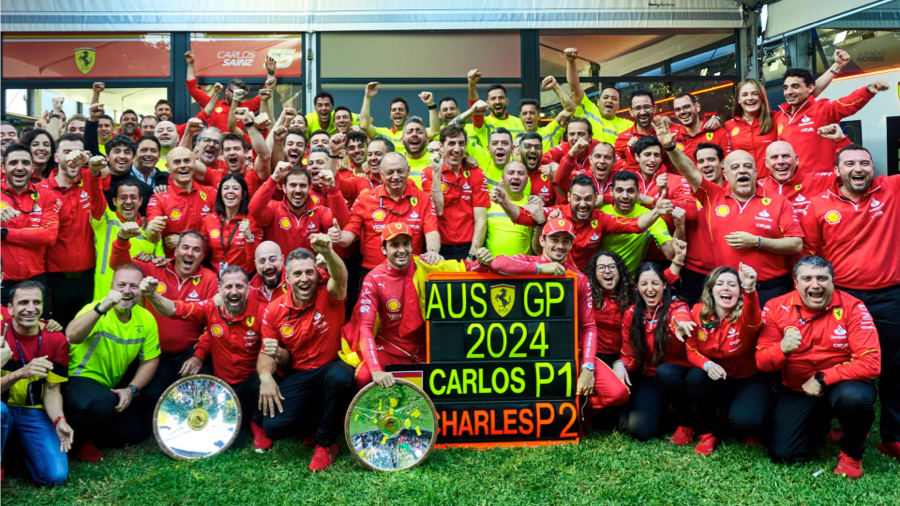
With success, it is important to bear in mind the words of Lewis Hamilton (who will join the Scuderia next season): “In racing there are always things you can learn, every single day. There is always space for improvement, and I think that applies to everything in life.” His words resonate with one set of our values: Ambition and Humility.
In November, we will meet virtually for our Investor and Analyst Call to update you about the present and discuss our future.

